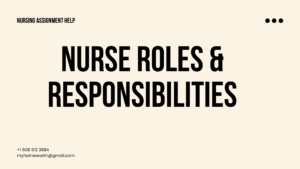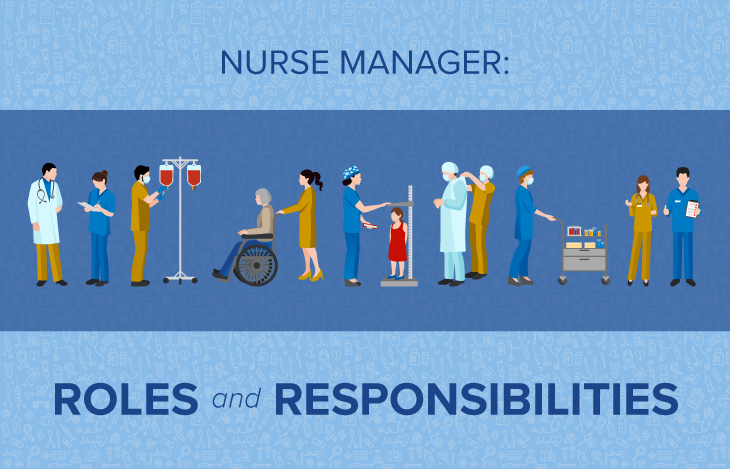Roles and Responsibilities of a Nurse in the Healthcare Industry

A nurse is a professional who provides patient care. Nurses are required to perform different tasks that may include monitoring and recording vital signs, administering medication and conducting physical examinations. Nursing jobs can be found in the nursing home, private clinic, hospital, rehabilitation center, and various other settings. The specific duties that nurses perform will depend on the type of job they hold. Some examples of nursing positions are: ICU nurse, Pediatric nurse, senior registered nurse, and more. Here are some Roles and Responsibilities of a Nurse in the Healthcare Industry.
Intensive care unit (ICU) nurse duties
Intensive care unit (ICU) nurses are Registered Nurses who work in medical facilities, including hospitals, clinics, and emergency rooms. Their role is to provide intensive nursing care to patients in severe or life-threatening conditions. In addition to working with patients, ICU nurses also assist other members of the health care team.
Depending on the type of intensive care unit, the nurses care for a variety of patients. The most common types of patients are those that are recovering from surgery or have life-threatening illnesses. Other specialized units, such as neonatal intensive care, are also used. These nurses work with babies who are born prematurely, or those who have suffered brain injury or cardiac disease.
Intensive care unit nurses often use high-tech equipment to help them treat patients. They must be trained to operate and maintain these tools, and also have a high level of experience with intubation and other life-sustaining medical devices.
Intensive care unit nurses work closely with physicians to ensure that patients receive the best care. They monitor patients’ vital signs and regularly adjust medication doses. Some nurses also perform other administrative duties.
Intensive care unit nurses must also have strong communication skills. They will frequently speak with other health care providers and their family members. They will prepare medication schedules and fill out transfer paperwork.
Intensive care unit nurses will follow strict safety guidelines. They must also remain calm and strong in the face of severe emergencies. It is important for them to be prepared to respond quickly to save a patient’s life.
Intensive care unit nurses typically work a 12-hour shift. Their salary can vary based on the industry they work in and the company they work for. Most employers require that they have one to two years of general nursing experience. However, some posts will accept newly graduated nurses.
Nurses in critical care need to have a wide range of skills, including mental and physical stamina, advanced clinical and technical expertise, and excellent communication abilities. They must also be flexible and have a passion for helping others. Those without this passion may find it difficult to cope with taxing and stressful schedules.

Pediatric nurse duties
Pediatric nurses are an integral part of the health care system. They are in demand as more people have access to health insurance. These nurses work in hospitals, clinics, schools and community services.
A pediatric nurse is responsible for administering medication, drawing blood, monitoring temperature and pulse, and assisting children through surgery and other procedures. These nurses are required to be empathetic and compassionate.
Although a lot of emphasis is placed on the care of patients, it is also important for nurses to have a healthy life/work balance. Pediatric nurses should have excellent communication skills. It is imperative that they be able to interact with both the patient and his family.
While some pediatric nurses are fortunate enough to have a job in a facility that allows for flexible schedules, many nurses must work long hours. As a result, they are often required to work on weekends, and some shifts can last as long as twelve hours.
When working with children, it is not uncommon for a pediatric nurse to provide comfort and reassurance to a child suffering from pain. Pediatric nurses are also expected to be able to dispel fear and provide information to parents.
The job of a pediatric nurse can be a rewarding one. They provide the best care to patients, and are often considered positive role models to children. To be successful, nurses must be compassionate, able to relate to others, and have strong organizational and time management skills.
The pediatric patient’s needs are very different from those of adults, so the pediatric nurse is challenged to provide optimum care while remaining on the cutting edge of medical technology. In addition to the obvious – taking blood and giving shots – a pediatric nurse is also required to be a great communicator.
Pediatric nurses are often trained in the most up-to-date methods for administering medications, and must be aware of state law and the latest workplace trends. Some pediatric nurses even work in the field of academia.
Pediatric nursing may not be as exciting as it used to be, but there are still plenty of opportunities available. Whether you are looking to start your own pediatric practice or just want to contribute to a healthy future for children, you can find a career in this highly rewarding field.

Senior registered nurse duties
Senior registered nurses have a variety of duties and responsibilities. They may supervise other nurses, or they might provide direct patient care. Some of the more common responsibilities include monitoring patient response, providing training and educating others, or coordinating a team of nurses.
Other responsibilities include managing the flow of patients, and evaluating their medical conditions. RNs are also responsible for maintaining high standards of customer service and promoting the well-being of patients, consultants, and other employees.
Nurses must be capable of working in a team, and they must be able to manage their time effectively. In addition, they must be familiar with local and national policy, procedures, and practices. This includes the use of evidence-based practice.
Among their many responsibilities, senior registered nurses must be able to monitor the effectiveness of medications they administer. They also must be skilled in acute care, home health, and care coordination.
The average salary for a senior registered nurse is $85,104. That is quite a bit more than the average salary for an assistant nurse.
Senior registered nurses tend to be detail oriented, and they are known for their communication skills. To become one, a senior nurse must first complete a nursing degree and pass licensure exams.
Senior registered nurses are also known to have a faster than average growth rate. Between 2018 and 2028, the number of people over the age of 65 in the United States is expected to increase by 12%. This means more opportunities for senior nurses.
Whether you are a beginner, or an experienced nurse looking for a new position, there are a variety of options available. Senior registered nurses have the opportunity to work in hospitals, private offices, or in other types of facilities. Many universities offer a variety of postgraduate courses in nursing, as well.
Depending on the organization, senior registered nurses may be required to take on on-call shifts. As with other professions, travel can be required.
Although the average salary for a senior registered nurse is above average, the salary is not as high as the salaries for head or staff nurses. A head nurse is more likely to receive a Doctorate degree, which results in a higher salary than a senior registered nurse.
Misconceptions about nursing job duties
Nursing is a professional career that has an array of responsibilities. Nurses work with patients, doctors, and other medical staff members to provide care for people. This involves collaboration, patient education, and advocacy. They may also work with other nurses to ensure the safety of a treatment plan.
Most nurses go through a rigorous degree program. Some specialize in certain fields of medicine. Specialties include paediatrics, cardiovascular care, intensive care, and emergency nursing. In addition, there are a variety of entry points to the profession. Some nursing programs require just an associate’s degree, while others offer graduate degrees.
Although many people believe that nursing is a glamorous job, the reality is that this is an intense, challenging career. It requires high skill, practical knowledge, and a lot of experience. A lack of leadership can negatively affect nurses’ self-image.
The media has a large influence on the public’s perception of the profession. Healthcare media often portrays extreme cases, which can contribute to the inaccurate image of nursing.
Gender roles are changing in healthcare. Many people do not recognize that male nurses can be as equally as important to the medical community as female nurses. Having a greater presence of male nurses could help reduce outdated gender-based stereotypes of the profession.
One of the most common misconceptions about the nursing profession is that nurses only provide basic care. While this is true, there are a number of specialties that do not involve blood. For example, a nurse who is an intensive care specialist can provide advanced treatment to a patient without directly working with the patient.
Another misconception about nursing is that it is a “women’s job.” Unfortunately, this is a misconception that is not only harmful to the nursing sector, but also to the public. Sadly, the public’s perception of nursing has not changed with the advancement of the industry.
One of the main reasons that nurses may be reluctant to speak up for their practice is that they do not believe that they have the power to change policies. To address this, they may want to consider becoming a leader in their own practice.


